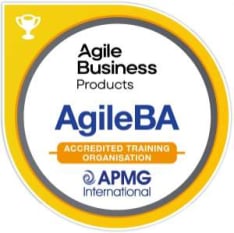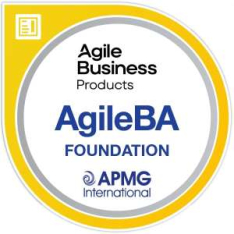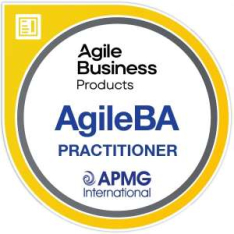Certified Agile Business Analyst Professional (CABAP) Outline
Module 1: Introduction to Agile Business Analysis
- Agile Methodology
- Agile Testing Methodology
- Business Analysis Principles
Module 2: Agile, Scrum, and Requirements for Analysing
- Overview of Agile
- Overview of Scrum
Module 3: Requirements for Analysing
- Introduction to Requirements for Analysis
Module 4: Sprint and Product Backlog
- Sprint Backlog
- Product Backlog
Module 5: Multi-Team Environment
- Overview
- Key Characteristics and Considerations
Module 6: Enhancing Business Value
- Introduction to Enhancing Business Value
Module 7: Cost Analysis
- Introduction to Cost Analysis
- Cost Estimation
Module 8: Information Radiators
- Understanding Information Radiators
Module 9: Definition of Done
- Definition of Done (DoD) Overview
Module 10: Navigation
- Introduction
- Key Aspects of Navigation in Business Analysis
Module 11: Best Practices
Module 12: Features
- Features of a Business Analyst
Module 13: Role of a Business Analyst
- Role of a Business Analyst Overview
Module 14: Responsibilities of a Business Analyst
- Responsibilities of a Business Analyst Overview
Module 15: Understanding Situations
- Business Context
- Stakeholder Analysis
- Problem Definition
- Data Collection and Analysis
- Root Cause Analysis
- Solution Identification
Module 16: Overcoming Problems
- Most Common Problems and Solutions
Module 17: Managing Business Change
- Introduction to Managing Business Change
- Types of Change Management
Module 18: Business Change Life Cycle
- Stages of Business Change Life Cycle
Module 19: Business Model Requirements
- Requirements Analysis and Modelling
- Requirements Analysis and Modelling Techniques
Module 20: Analysis Strategies
- Introduction to Analysis Strategies
- Common Thinking on Critical Planning Requirements
- Analysis Tools and Techniques
Module 21: Principles of Data Analysis
- Define Clear Objectives
- Data Quality
- Understand the Context
- Use Appropriate Methods
- Validate and Verify
- Interpretation and Inference
- Ethical Considerations
- Documentation and Transparency
- Continuous Improvement
Module 22: Data Rationalisation
- Introduction to Data Rationalisation
- Steps of Data Rationalisation
Module 23: Internal and External Environmental Analysis
- Internal Analysis of the Environment
- External Analysis of the Environment
Module 24: Key Performance Indicators
- Characteristics of KPIs
- KPIs for Business Analysts
- KPIs for Business Analysts Benefits
Module 25: Factors for Success
- Factors Determine Success of Business Analyst
- Success Factors for Requirements Planning
Module 26: Investigation Methods
- Investigation Methods Used by Business Analysts
- Brainstorming
- Workshops
- Interviews
- Observation
- Activity sampling
- Questionnaire
Module 27: Requirements Engineering
- Introduction to Requirements Engineering
- What are the Requirements?
- Elements of Requirements Engineering
- Application to Core Asset Development
Module 28: Business Process Modelling
- What is Business Process Modelling?
- Techniques of Business Process Modelling
Module 29: Stakeholder Management
- Introduction to Stakeholder Management
- How does Stakeholder Management Work?
- Failures in Stakeholder Management
- Achieving Good Stakeholder Management
Module 30: Analysing Stakeholders
- Analysing Stakeholders Overview
 To help and support our clients we are providing a limited number of 250 daily discount codes. Hurry, first come, first served!
To help and support our clients we are providing a limited number of 250 daily discount codes. Hurry, first come, first served!































 If you wish to make any changes to your course, please
If you wish to make any changes to your course, please


